Agenda: An Agenda of Hope
Proposal of Safe Return of Displaced Kashmiri Hindus
Intro: It is important to address all aspects of Kashmiri Pandits return like dignity, security and livelihood judiciously. The whole process needs to be backed up with subsequent logical steps.
Outlining the agenda of the NDA government in his inaugural address to the joint session of the Parliament, President Shri Pranab Mukherjee declared that “special efforts will be made to ensure that Kashmiri Pandits return to the land of their ancestors with full dignity, security and assured livelihood”. This is for the first time that any government at the Centre has talked about the return and rehabilitation of displaced community of Kashmiri Hindus on a priority basis. It is a very significant statement not only because it brought into national focus a community that has been languishing in despair and hopelessness for over two and a half decades but also because it has successfully defied policy of the status-quo of the union government on Jammu & Kashmir, if at all there ever was any. In that sense it is a remarkable departure from the past.

Predictable Reactions
The displaced community is rejoicing. The community was waiting anxiously for official attention after living a life of exile in their own country under years of apathy and neglect. Their pain, anguish, protests, petitions, tears and struggle had no impact on previous regimes. Separatists and their sympathisers on the other hand are protesting. So-called mainstream and semi-separatist political organisations of the Valley are voicing their disapproval a little cautiously. With elections to State Legislative Assembly due later this year, the issue is bound to generate more heat in the coming days.
Ruling National Conference Congress combine is trying to derail the process without being seen as villains. Hurriyat hawk SAS Geelani, who is not a native Kashmiri but a descendant of invading alien, has described safe and secure settlements for aborigines as “Israel-Palestine type situation in Kashmir and a move to permanently divide the majority and minority communities in the State”. As if the ethnic cleansing of Hindus in 1989-90 was a move to unite them. Hurriyat Conference, which otherwise is a divided house is seeing an opportunity to come together and jointly resist the Centre’s move. It will be pertinent to recall that these fundamentalists were opposed to even transit accommodation for 1,442 Hindu employees employed under Prime Minister’s package. Geelani had termed it as a Mossad move.
What next?
While the intent of the union government is clear the subsequent signals emanating from bureaucracy continue to be the poor carbon copy of the past approach that views the return as a mere economic issue. Hence, the tendency to revise incentives to lure the community back to its own land. This is a major flaw. The land and property belonging to the community, individually and collectively, that has been illegally and immorally grabbed alone costs several thousand crores.
We need to understand that the forced extirpation of the single largest minority of Kashmir valley is a challenge to the very idea of India as a secular democratic nation. Kashmir, to quote former Prime Minister Atal Behari Vajpayee, is the “symbol of our ancient civilisation and modern nationhood”. Radicalised Wahabi elements cannot be allowed to continue the free run and dictate terms and conditions of the return.
Return of persecuted minority Hindu community of Kashmir Valley is not a mere relocation of few hundred thousand souls. It is not an administrative exercise that can be left to the mercy of insensitive bureaucratic maneuvering. What we are talking about is the relocation of a proud civilisation back in its natural environs. It is ensuring historic continuity that was disrupted by upheavals of 1990.
The most crucial aspect of any rehabilitation plan is to eliminate completely all possibility of the repeat of 1989-90. It is in this sense that the displaced community comprising of around 70,000 families is asking for creation of a new city preferably adjacent to Srinagar.
Affirmative action needs to be taken to create space in the decision making system. Recognition of specific identity and viable means of sustenance are other essential components of the process. Certain confidence building measures like White Paper on events that led to mass exodus; justice for those who were killed; Temples and Shrines Management Bill, inclusion of displaced voters in electoral lists and issuance of EPIC before the coming Assembly elections are also vital to indicate that time for return is ripe. -Ajey Bharti














Comments